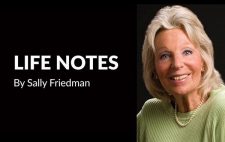A few years before she died, my mother gave me her two best casserole dishes. Enclosed within that gesture (along with love) was so much that was painful and resigned, so much that spoke without words, of renunciations.
Practical to a fault, Mom had insisted, quite rationally, that these two delicate, white-porcelain vessels with sprigs of flowers were only in her way. But once, they hadn’t been.
Back then, my mother had given wonderful parties, and she had hosted unforgettable holiday meals, including years and years of Thanksgiving dinners. For days in advance, she would bake and clean and polish and fuss, pretending to mind it, but secretly enjoying every moment of planning.
On party night, before the guests arrived, my sister Ruthie and I would be dispatched to bed, but it was expected – and accepted – that we would spend the evening crouched at the top of the steps watching and listening, lost in the fascinating, baffling world of grown-ups.
Holidays had a kind of magic. They linger in memory. As do the white casserole dishes, so fine, graceful and always pressed into service.
“Now don’t drop them!” my mother would caution, as my sister and I felt oddly privileged to be drying them after Mother had gently washed the dishes in oceans of suds.
Those casserole dishes reached back to another time, a time when I watched my mother as hostess in unabashed awe as she moved about, knowing exactly what to say and when to smile.
My mother had some parties after my father died, but they were never the same. Even the laughter seemed muted.
But on a few holidays, we still sometimes gathered in the small apartment my mother had moved to, and those two English porcelain casseroles were back in service. We always joked that even a small army could not go hungry, given the epic proportions of those gorgeous servers.
Then gradually – no one could say precisely when – all holidays were celebrated elsewhere. Aunt Dorrie’s. Cousin Betty’s. Ruthie’s place or mine. Did they begin to remind her, too painfully, of a past that had slipped away, taking with it her parties and her long, long hold on Thanksgiving? And how did she know the precise moment to pack them in layers of tissue paper and hand them over to me along with all they represented?
My mother was a sensible lady. She didn’t hang on to bygones. But something – the quiver in her voice, the flicker of regret in her beautiful green eyes – told me that she, too, recognized the symbolism of those casseroles with their fluted lids. We spoke not a word. But in a single instant, my mother and I knew that once more, in a long chain of smudged endings and beginnings, we were letting go of what was.
Now, years later, as I find myself wanting to give our daughters things I cherish, I better understand how that feels. I think they call it “passages.” They say it’s a natural part of the life cycle, this passing on of family treasures.
So why, did I find myself wiping away tears recently as I wrapped those two beautiful, fragile white casserole dishes in layers of tissue paper to transport to our daughter Jill’s home, one only a few miles away from her late grandmother’s?
But oh my, what miles represent.
Light years of family memories. Of generations gone. Of family Thanksgivings that were not of the Norman Rockwell sort, but were uniquely ours.
This year, on Thanksgiving Day at Jill’s, I will volunteer to wash my mother’s casserole dishes by hand, separated from the mountain of all other holiday dishes. And you can be sure I will handle them with tender loving care as I gently place them in our oldest daughter’s china closet.
Sally Friedman can be reached at sfriedman@sjmagazine.net.










